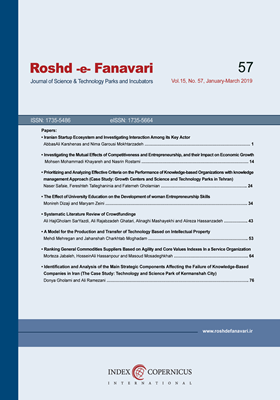A Model for the Production and Transfer of Technology Based on Intellectual Property
Subject Areas : انتقال فناوري و تجاريسازي پژوهشMehdi Meregan 1 * , Jahanshah Charkhtab-moghadam 2
1 -
2 -
Keywords: Intellectual Property Technology Transfer Manufacturing Technology Transfer Model Delphi Method,
Abstract :
The empowerment of each country in the fields of science and technology requires attention to indigenous knowledge and, of course, the use of the experiences of developed countries in these areas. Therefore, production and technology transfer should be considered together in order to prevent the waste of time and energy, also provide scientific grounds for localization. This is important when the intellectual property of technology transfer, as a supportive power of the technology owner, is also taken into consideration. Because of its importance, in this paper, by presenting a model, we draw a proper path in the production of domestic technology along with the transfer of technology that has been consulted by the elite. The resulting model explains the process of manufacturing and transferring technology from the legislative stage to the product delivery of the technology. In this model four phases of infrastructure, creation, supportive and final are considered. In the infrastructure phase, the legal dimensions of intellectual property laws as well as methods for creating the right conditions for the transfer and production of technology in the Government, Parliament and the Guardian Council are examined. In the phase of creation, the responsibilities assigned to the relevant ministries, as well as the improvement of the power of science and technology parks along with the appropriate direction for them. The supportive phase is a guarantee of the implementation of the law and, in addition, it has a supportive role in creating a suitable platform for technology vendors. Finally, the process of fusing and commercializing technology in the final phase is examined.
1- باقرزاده، مجید؛ مفتاحی، جلال، بررسی عوامل مؤثر بر انتقال فناوری صنایع کمپرسور در شرکتهای ایرانی، نشریه فراسوی مدیریت، شماره 16، صفحه 125-154، 1390.
2- عابدی، زهرا، تنگناهای ساختاری علمی- صنعتی و تکنولوژیک کشور و راهبردهای لازم برای انتقال و توسعه موفق تکنولوژی، نشریه رهیافت، شماره 20، صفحه 42-53، 1387.
3- زهتابچیان، محمدحسین، ناصری گیگلو، انتقال تکنولوژی، عصر مدیریت، شماره 14، صفحه 110-115، 1389.
4- آقايي، حسن و منوچهر، «انتقال تكنولوژي»، مركز تحقيقات و خدمات خودكفايي ايران، سازمان گسترش و نوسازي صنايع ايران، 1369.
5- سلامی، رضا، عوامل موفقیت در انتقال تکنولوژی و توسعه صنعتی کشورهای در حال توسعه، صنعت و توسعه، شماره 17، صفحه 4-8، 1387.
6- آقايي، حسن و منوچهر، «انتقال تكنولوژي»، مركز تحقيقات و خدمات خودكفايي ايران، سازمان گسترش و نوسازي صنايع ايران، 1369.
7- صادقی، محسن، واکاوی حقوق مالکیت فکری در ایران، فصلنامه نقد کتاب اطلاعرسانی و ارتباطات، شماره 3-4، صفحه 176-188، 1393.
8- حاج شریفی، علیرضا، «حقوق مالکیتهای معنوی و جذب و انتقال تکنولوژی در کشور»، مجموعه مقالات دومین سمینار علم، تکنولوژی و توسعه، جلد اول، مرکز نشر دانشگاهی صنعتی امیرکبیر، 1372.
9- بزرگی، وحید، بررسی تطبیقی قوانین و مقررات ایران با مفاد موافقتنامه تریپس در زمینه حق نسخهبرداری و حقوق مرتبط، مطالعات فرهنگ- ارتباطات، شماره 24، صفحه 27-40، 1392.
10- میراحسنی، منیرالسادات، شاخصهای رقابتپذیری ایران و برخی کشورهای جهان از منظر گزارش مجمع جهانی اقتصاد (2013-2014)، مجله اقتصادی، شمارههای 9 و 10، صفحه 107-128، 1392.
11- شیری، حامد، بررسی رابطه دانشگاه با صنعت و چالشهای آن: پژوهشی کیفی در بین دانشجویان دانشگاه تهران، نشریه صنعت و دانشگاه، سال هشتم، شماره 29 و 30، صفحه 1-10، 1394.
12- تقویفرد، محمدتقی؛ مقیمی شهری، بهزاد؛ هوشنگی، محسن، انتخاب روش مناسب انتقال تکنولوژی با استفاده از روش دیمتل و فرایند تحلیل شبکهای در دو شرکت بزرگ تولیدی ظروف چینی خراسان، فصلنامه علمی- پژوهشی مدیریت توسعه فناوری، شماره 4، صفحه 75-100، 1394.
13- نقیبالسادات، سیدرضا؛ جوادی، محمد عباس، روش دلفی، کتاب ماه علوم اجتماعی، شماره 37، صفحه 70-77، 1390.
14- سیفی قره یتاق, داود، اثر سطوح حمایت از حقوق مالکیت فکری بر انتقال فناوری و توسعه اقتصادی، اولین کنفرانس بینالمللی حقوق و توسعه پایدار جامعه مدنی، شیراز، دانشگاه آزاد اسلامی واحد علوم و تحقیقات فارس، 1394.
15- منطقی, منوچهر؛ مهدی تقوی بافقی و محمدکاظم کشورشاهی، ۱۳۹۲، نحوه حفظ مالکیت معنوی در پروژهای انتقال تکنولوژی به روش همکاری، کنفرانس ملی حسابداری و مدیریت، تهران، مرکز همایشهای پژوهشگاه نیرو، 1392.
16- مشهدی، علی. محتشمی، میترا.، «رابطه میان حقوق بینالملل محیطزیست و حقوق مالکیت فکری؛ بررسی اسناد و رویههای بینالمللی»، فصلنامه علمی تخصصی پژوهشهای حقوقی دانشگاه قم، 1390.
17- شعوری، مریم، نجفی، امیر، "بررسی تأثیر توسعه نظام مالکیت معنوی و دانش ثبت شده در ایجاد انگیزه برای نوآوری صنعت" فصلنامه علمی پژوهشی ابتکار و خلاقیت، 1396.
18- S. Lee, B. S. Kim, Y. Kim, W. Kim, and W. Ahn, “The framework for factors affecting technology transfer for suppliers and buyers of technology in Korea,”. Technology Analysis & Strategic Management, vol. 30, pp. 172-185, 2018.
19- V. Gupta, M. Sengupta, J. Prakash, and B. C. Tripathy, Intellectual Property Rights. In Basic and Applied Aspects of Biotechnology (pp. 487-501). Singapore, Springer, 2017.
20- V. Kumar, U. Kumar, and A. Persaud, "Building technological capability through importing technology: the case of Indonesian manufacturing industry". The Journal of Technology Transfer, vol. 24, pp. 81-96, 1999.
21- J. M. Artz, "Thinking About Technology: Foundations of the Philosophy of Technology, Joseph C. Pitt." Ethics and Information Technology, vol. 2, p. 249, 2001.
22- W. R. Scott and G. F. Davis, Organizations and organizing: Rational, natural and open systems perspectives. Routledge, 2015.
23- V. Chiesa and R. Manzini, “Organizing for technological collaborations: a managerial perspective,” R&D Management, vol. 28, pp. 199-212, Jul 1998.
24- T.M. Khalil, Management of technology: The key to competitiveness and wealth creation. New York: McGraw-Hill Science, 2000.
25- G.A. Lee, “Negotating Technology Acquisition: getting the tools you need to succed,” working paper, Nanyang Technology University, 1998.
26- E. Robert and C. Berry, “Entering New Businesses: selecting strategies for success”, Sloan management review, vol. 26, pp. 73-84, 1985.

